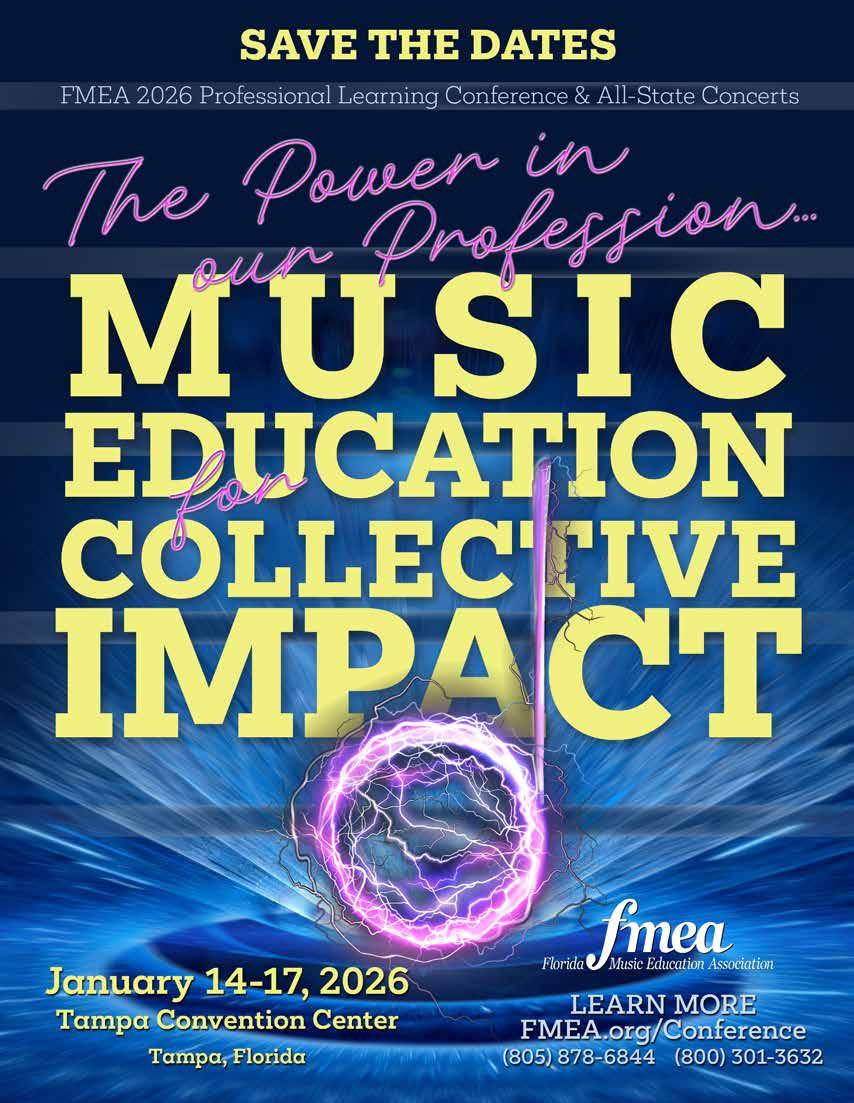An Interview With Cynthia Berry



PLUS: ADVOCACY: What is it? Whathaveyoulearned?
Session Proposalsand Performance Applications Whatareyoudoing this summer?

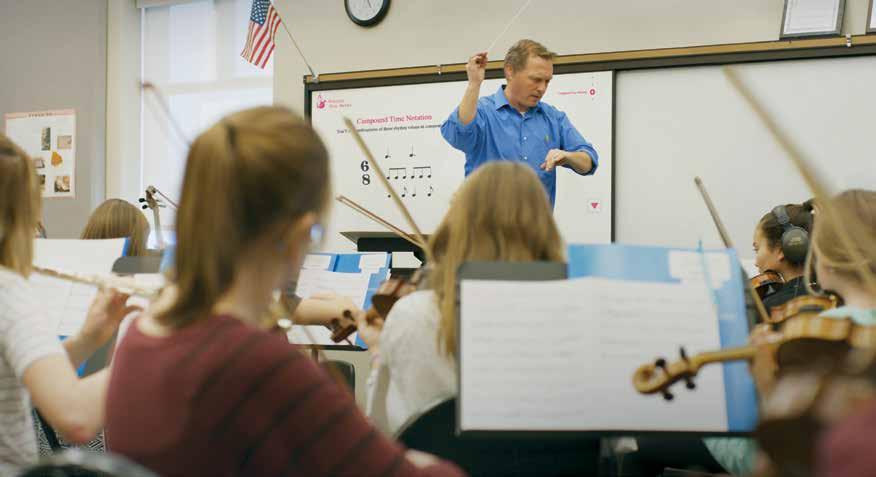
Your rehearsal time is precious, and every minute counts. But when students hit a roadblock in their understanding — like struggling with rhythms or key signatures — it can slow everything down. Our new feature, Theory On The Go, is designed to keep the momentum going. With access to Breezin’ Thru Theory’s vast resources, you can instantly pinpoint clear explanations, drills or games, create targeted assignments or easily access the full curriculum to build a lesson plan in seconds. Whether it’s for in-the-moment teaching or to support repertoire learning, Theory On The Go is your new go-to tool, because music theory should never slow you down.
Part of your 25/26 subscription!
Get Your Quote Now! info@breezinthrutheory.com or call 855-265-3805

Executive Director Florida Music Education Association
Kathleen D. Sanz, PhD Hinckley Center for Fine Arts Education 402 Office Plaza Tallahassee, FL 32301 (850) 878-6844 or (800) 301-3632 (kdsanz@fmea.org)
Editor-in-Chief
Kelly Miller, DMA University of Central Florida 12488 Centaurus Blvd. Orlando, FL 32816-8009 (407) 823-4545 (kelly.miller@ucf.edu)
Editorial Committee
Terice Allen (850) 245-8700, Tallahassee (tallen1962@hotmail.com)
Judy Arthur, PhD Florida State University, KMU 222 (850) 644-3005 (jrarthur@fsu.edu)
William Bauer, PhD University of Florida, Gainesville (352) 273-3182; (wbauer@ufl.edu)
Alice-Ann Darrow, PhD (alifsu@mac.com) Jeanne Reynolds (jeannewrey@gmail.com)
John K. Southall, PhD Indian River State College, Fort Pierce (772) 462-7810; (johnsouthall@fmea.org)
Advertising Sales Valeria Anderson (val@fmea.org) 402 Office Plaza Tallahassee, FL 32301 (850) 878-6844
Official FMEA and FMD
Photographers
Bob O’Lary Amanda Crawford
Art Director & Production Manager Lori Danello Roberts LDR Design Inc. (lori@flmusiced.org)
Circulation & Copy Manager Valeria Anderson, (800) 301-3632
Copy Editor Susan
Jason P. Locker President Florida Music Education Association

s I sit down to write my last president’s message, I am filled with gratitude for the unwavering dedication and passion each of you brings to music education in Florida. Your efforts have not only nurtured the musical talents of our students, but have also reinforced the vital role of music in our schools and communities.
The FMEA Board of Directors has done incredible work over the past two years on behalf of our members, and they have been supported every step of the way by the outstanding team of professionals at the June M. Hinckley Center for Fine Arts Education. The mission of the Florida Music Education Association is to promote
w Production of very successful 2024 and 2025
FMEA Professional Learning Conferences with more than 200 high-quality interest sessions receiving perfect 5-star member feedback ratings and a stellar lineup of performers, drawing 10,000-plus participants each year
w Introduction of the High School Honors Big Band in 2025, and approval of the upcoming All-State Middle School Guitar Ensemble (debut in 2026)
w Improvements to conference infrastructure, including the dynamic conference app, introduction of a digital conference program, integration of beautiful new meeting space and free Wi-Fi throughout the Tampa Convention
Center, on-demand badge printing to alleviate registration lines, digital all-state concert ticketing, and the introduction of online conference hotel reservations
w Continued strengthening of our Corporate & Academic Partners program, with additional sponsored performers and presenters at conferences
w Addition of the Health & Wellness Quiet Room, open to all attendees in the Tampa Convention Center throughout the conference
w Outstanding advocacy efforts through our annual FMEA Awards Program, the new conference Advocacy Center, postcard/email/letter writing campaigns, and
Collegiate Advocacy Days culminating in the passage of the bill that has established the Florida Seal of Fine Arts
w Rebranding of the FMEA Summer Institute as the Teach Music Florida Coalition, an annual think tank identifying needs and implementing programs to aid in the recruitment and retention of music educators in our state
w Increasing the allocation of funds to our board-designated reserve accounts to maximize our preparedness for any future emergency the association may face
w Undertaking a comprehensive public relations and marketing initiative to study and elevate the association’s brand, com-
munications, and stakeholder engagement
w Revitalization and expansion of the FMEA Festival Series (Guitar, Steel Band, and Crossover Music Festivals), our Emerging Leaders Program, and Multicultural Network Summer Workshop
w Continued excellence in publication of The Florida Music Director and Research Perspectives in Music Education
w Revisions to FMEA’s organizational structure, which create pathways for new groups of music educators to organize and affiliate under the FMEA umbrella
w Maintaining the highest number of collegiate members and total members of all NAfMEaffiliated state MEAs
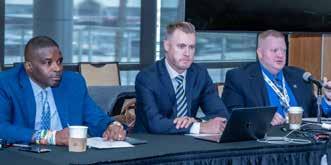
quality, comprehensive music education in all Florida schools. I am proud of the leadership, creativity, and teamwork each board and staff member has brought to our collaborative efforts in service to this mission!
At the beginning of my presidency, I charged our entire FMEA leadership team to be good stewards of our association, and to make sure that we leave it better than when we started. Thanks to the investment of time and effort by each one, I am confident that this team has made an undeniably positive impact on FMEA’s remarkable history!
We owe our collective gratitude to so many. As he completes his six years on the Executive Committee, I want to again thank Immediate Past President Dr. Shelby Chipman for the leadership, vision, and courage that brought FMEA back following the pandemic. Executive Director Dr. Kathy Sanz, Director of Operations Val Anderson, Director of Information Technology Dr. Josh Bula, and Conference Planning Chair Dr. John Southall make it all happen behind the scenes, and we could never possibly thank them enough! Our next president, Dr. Skip Pardee, will keep FMEA moving onward and upward, and I look forward to supporting his vision for the association.
As I sign off, my hope is that the message “Music Education Begins with ME” has been one of self-reflection and empowerment for each of us. I truly believe that you and your students are the secret ingredients that make your classroom a sacred space, where lives are changed daily for the better. FMEA sees you, hears you, and honors your work. And it has been the honor of my life to serve as your president.
Music Education Begins with ME … It Begins with YOU … It Begins with WE!

Jason P. Locker, President Florida Music Education Association
2024-25 FMEA
MEMBERSHIP: You are eligible for membership in the Florida Music Education Association if you are an individual engaged in the teaching, supervision, or administration of music in elementary and secondary schools, colleges, or universities within the state. Visit FMEA.org/membership to learn more about the benefits of active membership.
SUBSCRIPTIONS: Direct correspondence regarding subscriptions to: Hinckley Center for Fine Arts Education, 402 Office Plaza, Tallahassee, FL, 32301-2757. Subscription cost included in FMEA membership dues ($9); libraries, educational institutions, and all others within the United States: $27 plus 7.5% sales tax.
CIRCULATION: The circulation of the Florida Music Director is 4,500 educators. Published eight times annually by The Florida Music Education Association, Hinckley Center for Fine Arts Education: 402 Office Plaza, Tallahassee, FL 32301-2757. FMEA reserves the right to approve any application for appearance and to edit all materials proposed for distribution. Permission is granted to all FMEA members to reprint articles from the Florida Music Director for noncommercial, educational purposes. Non-members may request permission from the FMEA office.
SUBMISSIONS: Article and art submissions are always considered and should be submitted on or before the 1st of the month, one month prior to the publication issue to: Kelly Miller, DMA, kelly.miller@ucf.edu.
All articles must be provided in digital format (e.g., Microsoft Word). All applicable fonts and images must be provided. Images must be at least 300 dpi resolution at 100% of the size. All submissions must be accompanied by a proof (color, if applicable). Ads may be submitted via email to val@fmea.org
The Florida Music Director is made possible by businesses and organizations that advertise with us. They make it possible to provide you with a high-quality publication, and we gratefully acknowledge their support of our mission. We hope you will take special notice of the following advertisement and consider the products and services offered. It is another important way you can support your professional association and the enhancement of Florida music education.
The publisher does not endorse any particular company, product, or service. The Florida Music Education Association (FMEA) is not responsible for the content of any advertisement and reserves the right to accept or refuse any advertisement submitted for publication. Information for advertisers (rate card, insertion orders, graphics requirements, etc.) can be found at FMEAMediaKit.org Florida Music Director reserves the right to refuse any ad not prepared to the correct specifications OR to rework the ad as needed with fees applied.
Breezin’ Thru® Theory IFC William Carey University 9
The advertisers shown in bold provide additional support to FMEA members through membership in the Corporate and Academic Partners (FCAP) program. FCAP partners deserve your special recognition and attention.





Jeanne W. Reynolds Chairperson Advocacy Committee
These are the two questions I posed to our collegiate members at our Collegiate Advocacy Day held March 27 in Tallahassee. Read their responses. They have much to teach all of us. You will be inspired by their responses and yes, even the answers where they may have gotten a little help from their AI friends! What follows are some samples of their answers, with minor edits to grammar and punctuation.
What is advocacy?
w Speaking on behalf of educators and fine arts programs when they are unable to.
w Advocacy is speaking up for things that you believe are worth supporting and/ or talking about.
w The opportunity to speak up on social and political issues for those who can’t. It’s putting a face to a name or data collected for those who can help make that difference.
w Advocacy is about speaking up about issues that you see and making them known on a bigger scheme. It is about being a voice for those who don’t have one or [don’t] think they do.
w Advocacy is a marathon, not a sprint, of continuous support and speaking on the behalf of others in order to preserve what we hold dear.
w Making voices heard, making people in power understand WHY we do the things we do and why
they’re important, spreading awareness.
w Advocacy is using your voice to bring awareness about the things your programs want to see in school by going to the legislator directly and saying it to their face.
w Advocacy is sharing the daily reality of a situation with those who do not experience it directly. Generally, it is speaking for those whose voices should be heard.
w Advocacy is speaking on behalf of a cause, one you are passionate about and one that can often be ignored.
w Speaking for a certain cause as well as reminding people of the importance of a certain cause.

w To fight for something. Stand for something, and present why others should.
w Informing your audience about the importance of the position you’re fighting for (not just for you but for them, too) and persuading them to support you.
w Advocacy is an effort to bring awareness to something you are passionate about in order to spark passion in others.
What have you learned by participating in Collegiate Advocacy Day?
w There is much support for music education, and there is hope, but we must not be complacent.
w I learned that most of our leaders are on board with

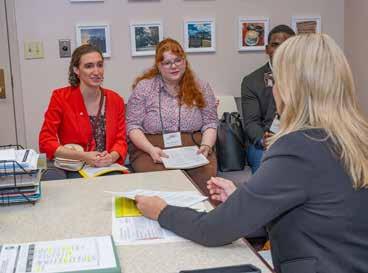
the ideas we have; you just have to show them how important these issues are to you by visiting them in person. Emails and calls can only take you so far.
w Government is a slow process. The long game is the vital strategy.
w If you are passionate about anything and want it to be protected or supported, it is your right and responsibility to advocate for it, and it is our legislators’ job to listen to us.
w Our voices are truly heard, and the advocating we do is truly noticed.
w The legislators already want to help; they just want to know what their constituents want.
w Bills have more agendas than the ones we want. There are compromises and sacrifices in every situation.
w I learned lots about the legislative process! The opportunity to sit in on the Senate hearing was incredibly valuable. I learned more about the scrutiny bills undergo in committee, how public testimony is heard, and how
senators can sponsor bills.
w I learned congressmen and women are willing to listen to any ideas you have to improve the state or country.
w I was pleasantly surprised by the level of support and enthusiasm I encountered from the lawmakers and aides I interacted with. Every single aide I talked to had at least some experience as a music student!
w It was a helpful experience for me to practice advocating for music education using my personal experiences and what I’ve learned thus far about its importance.
w I learned that talking to representatives is not nearly as scary as I would’ve
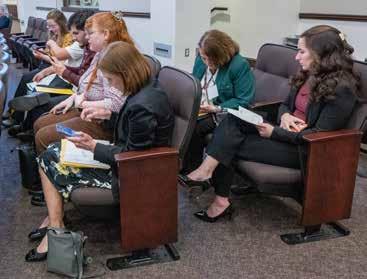
imagined. It actually felt empowering and rewarding.
w It feels good to actually bring these points to the legislator myself, rather than hoping someone [else] says something.
w Collegiate Advocacy Day helps remind me that change starts with me and that we need to shape the future of music education from the very beginning. Collegiates are preparing to enter into this work field full of opportunities, but sometimes we need to fight for what we want.
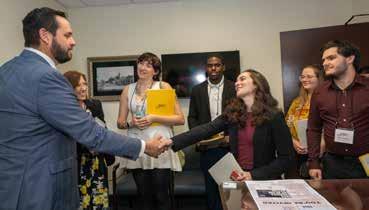
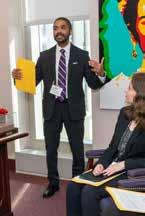
As this school year ends, take a moment to reflect on what advocacy means to you. What will you do this summer to advocate for strong music education for your students and your community? Hopefully our collegiate members’ responses have inspired you to learn and DO more. If these college students were willing to step out of their comfort zone, to meet and visit with legislators, you can do it, too. In the words of one of our students, “I learned that talking to representatives is not nearly as scary as I would’ve imagined. It actually felt empowering and rewarding.” Go ahead, make that summer appointment with your local legislator. We are counting on you. Be a strong advocate for music education.
OCTOBER 17, 1966– FEBRUARY 25, 2025

David U. Reynolds, 59, a beacon of unwavering friendship and kindness, passed away on February 25, 2025. He was born October 17, 1966, in Massachusetts. When Dave was 5 years old, his family moved to Florida. He always spread joy and happiness. As a teenager, Dave was a Royal Ranger and loved the outdoors. As an adult, he was a survivalist. David loved working for the International Alliance of Theatrical Stage Employees (IATSE) and was president of IATSE, Local 477. David enjoyed working in theatre, movies, television shows, performances, and concerts. He especially loved and was sought after as a carpenter and set dresser for movies and television shows (vintage pieces for the sets).
David has left an indelible mark on the hearts of all who were fortunate enough to know him. He is survived by a loving wife, Dorie, one son and two daughters, and five grandchildren (three in Michigan and two in Florida) who will continue to honor his legacy by living their lives to the fullest. The highlight of his day was having afternoon snacks with Sophia (granddaughter) and going to their favorite pizza spot, Little Italy in St. Pete. Pepe, affectionately named by Sophia, had special Tuesday night sleepovers every week. David’s favorite meal was a Chinese dinner.
FMEA offers condolences to David’s family and his many friends. We will miss him.
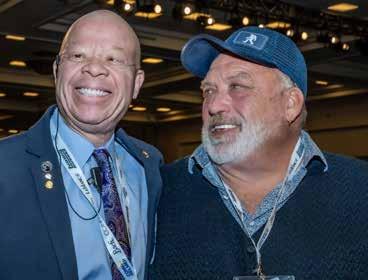
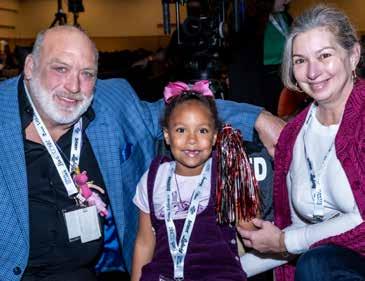

May 9 Gainesville (Santa Fe College)
May 15 Tampa (University of South Florida)
May 17 Tallahassee (Florida State University)

The Winters School of Music invites you to be a part of the William Carey family!
• Incredible Scholarships
• Mississippi’s FIRST All-Steinway School
• Bachelor degrees in Music Education, Worship Leadership, Worship Technology, Music Therapy, Performance and more!
• FULLY ONLINE Doctor of Arts in Music, Master of Music Education, and Master of Music in Worship Studies
• Top 10 Most Affordable Online Music Degrees according to Online U!
• NO Out-of-state tuition!
2024/2025 Scholarship
Friday, November 15
Friday, January 17
Friday, March 7
To reserve an audition day or request a time that works better for you, please email music@wmcarey.edu or call 601-318-6175
Save the Dates
Carey Honor Band January 30 – February 1
Carey Jazz Festival March 21 Carey Honor Choir April 10-12


The state and district leadership of our component associations (FBA, FOA, and FVA) aims to provide excellent stewarding of existing music programs and to champion better opportunities for aspiring musicians. This requires leaders to be efficient organizers of persons, resources, and projects, in addition to planning paths to fulfill the vision of a better tomorrow for music education in Florida. This professional development opportunity will provide communication training, team-building, scenario-based problem-solving, implications of the latest developments in technology, guidance on laws relating to music education, and other skills identified by participants as a need to find success as a leader in Florida.
The training is designed in partnership with the FSMA component organizations: Florida Bandmasters Association, Florida Orchestra Association, and Florida Vocal Association. Approximately 16 to 20 participants will be selected through an application process. FSMA will cover hotel expenses and meals during the training.
July 13-16, 2025
Application Deadline: April 1, 2025


Benny L. Bolden, Jr., EdD President Florida School Music Association
Dearesteemed members, as we move forward through another impactful year of music education, I want to take a moment to express my deepest appreciation for each of you. It is truly an honor to serve as president of the Florida School Music Association and to represent such a passionate, talented, and dedicated community of educators and leaders.

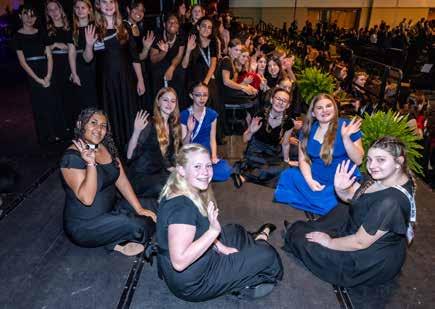
Your continued service to the teaching profession, and specifically to music education, is nothing short of extraordinary. Each day, you pour your energy, creativity, and heart into shaping the next generation—not only as musicians but as thoughtful, disciplined, and inspired individuals. You create safe spaces for students to grow, to express, and to connect through the power of music. In doing so, you are changing lives, often in ways that go far beyond the stage or the classroom.
We know that the challenges facing educators today are real—from evolving educational policies to increased demands on time and resources—yet you persist with passion and purpose. Your resilience is a testament to your unwavering belief in the value of what we do, and FSMA stands with you every step of the way.
As an association, our mission is to support, uplift, and advocate for music educators like you. We are committed to fostering environments that promote artistic excellence, educational equity, and professional growth. Together, we are building a future where every student in Florida has access to a high-quality music education—one that nurtures creativity, discipline, and joy.
Let us continue to encourage one another, share our best practices, and celebrate the wins—big and small—that come from the hard work you do each day. Never underestimate the lasting impact you have on your students, your schools, and your communities.
Thank you for your steadfast commitment to this noble profession. Thank you for continuing to lead, inspire, and believe in the transformative power of music.

With sincere gratitude and encouragement,
President
BY AARON KASS
“So if you ask I can
It is May, and the end of another academic year is upon us. It can be a time full of amazing moments and not-so-amazing ones, all of which come with their own little stresses on top of just being a person outside of work. It can be difficult to “remember your why.” What is your reason for doing this teaching thing? It certainly isn’t Benjamin Franklins lining our coffers! Life can become so dense that we forget our “why,” and when this happens we should try creating space.
Does the thought of “meditating” intimidate you? It can often feel foreign and esoteric as if it is something only for monks or “holy people.”
In reality, it’s a skill we hone and master much like practicing a piece of music. It is the art of focusing the mind through repeated intentional practice. This is why it is often referred to as a “meditation practice.” It is an action in and of itself and one that we get better at through intentional repetition. Much like practicing scales or warming up can create muscle memory and become automatic, so can our ability to stay grounded through difficult and stressful times, whether immediate or in general, with intentional practice. However, in order to achieve this, we must first create it:
Take a deep breath.
Exhale and relax your shoulders. Repeat your deep breath three times and allow your body to naturally take over your breathing. Let it go. Trust that the body will do its thing. As we center ourselves in this moment, feel into this space and meet everything with grace. When something enters your mind, allow it, let it go, and bring your attention back to the breath. Take another deep breath and restart. Do this as many times as you need for five minutes.
continued on page 14

why we meditate, would say it’s so we become more flexible and tolerant to the present moment.”
Pema Chödrön American-born Tibetan Buddhist)

continued from page 12

Be gentle with yourself.
“Gentleness with yourself, Aaron” is the farewell my counselor gives me every session with a kind and warm smile. It has become a mantra for me, something that I repeat to myself both externally and internally. When we sit in stillness for any amount of time, the mind does what the mind does and brings up thoughts, emotions, and even the awareness of physical sensations. Rather than push it away, meet all of it with gentleness and allow yourself to put down anything that troubles you, just for this moment. It will be there when you return, but you need not carry those burdens always. The space and focus created through mediation is what we then recall in stressful times, and the more times we practice, the easier it becomes to recall this space and create it in our day-to-day living. The more space and gentleness we offer ourselves, the easier it is to give to others.
Staying grounded in the moment, and in our lives at large, is much like trusting the body’s natural ability to functionally breathe. In most cases we must let go and allow it. Rather than projecting expectations and holding onto feelings that arise when those expectations are unmet, we meet the reality of the moment for what it is and act accordingly, not reactively. Through this practice of allowing, we create space for what is to be present in our lives and meet it with gentleness.
Carving out time for oneself can feel counterintuitive, whether it’s due to a busy schedule, those that rely on us
for survival (namely our families), or simply devaluing the time spent sitting in mediation as “wasted time” and unproductive. “I don’t have time” or “Am I doing it right” are the usual feelings that come up, but be honest with yourself, there are five minutes somewhere to sit and breathe and to remember “gentleness with yourself.” We must not forget that we, for the most part, create our schedule. Life, work, friends, concerts, parents, laundry, dinner, cleaning, children—these things often have dates and times associated with them in our calendars. Have you scheduled time for yourself?
Taking time to just “sit and breathe” can seem quite foreign and scary to a mind and body that is used to always being on the go. There is no secret magic trick other than the simple desire to create it and be so. It’s not selfish to take the time and create a calm safe space to breathe and to remember your why.
Be generous and give it to yourself.
You are worth every minute.
Aaron Kass is the associate choral director at Lake Nona High School in Orlando, Florida, and serves as the chairperson of the FMEA Mental Health & Wellness Committee.

Reference Warren, R. (2013). The purpose driven life: what on earth am I here for? Zondervan.

“The greatest gift you can give someone is your time.”
Warren (2013).
Thank you to all of the donors who have shown their dedication to the improvement of music education in Florida by supporting our Mission through financial contributions.
Our donors support specific causes by donating to the FMEA funds of their choice:
FMEA Scholarship Fund
Music Education Advocacy
General Fund
June M. Hinckley Scholarship
Professional Development for Members
Mel & Sally Schiff Music Education Relief Fund
The following have graciously donated to FMEA from April 1, 2024, through April 7, 2025.
$10,000 and up
$1,000 – $9,999
No current donors at this time. All County Music
Frank Howes
In Memory of Vashti Jordan
Howes
Clifford Madsen
$100 – $999
Carlos Abril
In Honor of Dr. Alice-Ann Darrow
Artie Almeida
Lucinda Balistreri
In Honor of Sarasota County Music Educators
Trent Brown
In Honor of J. Mark Scott
Dale Choate
In Honor of R. Wayne Bailey
Alice-Ann Darrow
In Memory of Mr. & Mrs. O.B. Darrow
Virginia Dickert
In Memory of Debbie Liles & Lindsay Keller
William Fredrickson
Shelby Fullerton
In Memory of Dan Fullerton
Marsha Juday
Aaron Kass
Steve & Beth Kelly
Sheila King
Jason Locker
In Memory of June M. Hinckley
Joseph Luechauer
Deborah Mar
In Memory of Barbara Kingman
Russell Robinson
Fred Schiff
In Memory of Mom & Dad
Louis Schiff
Kelly Miller
Carolyn Minear
In Memory of Alice Fague
John Nista
In Memory of Stanley Dmitrenko
Mary Palmer
Douglas Phillips
In Memory of Dr. Bobby Adams
David Pletincks
In Honor of My Children
Clinton Randles
Jeanne Reynolds
In Honor of Pinellas County Performing Arts Teachers
Mary Catherine Salo
In Memory of Gary Rivenbark & Wes Rainer
Steven Salo
In Honor of Dr. Bill Prince & In Memory of John "Buck" Jamison
Kathleen Sanz
In Memory of June M. Hinckley
J. Mark Scott
In Honor of Jason Locker, Dr. André Thomas, Dr. Judy Bowers, & Dr. Judy Arthur
John Sinclair
D. Gregory Springer
Harry Spyker
In Honor of Fred & Marlene Miller
Jeannine Stemmer
In Memory of Barbara Kingman & Lauren Alonso
Leiland Theriot
In Memory of Clayton Krehbiel
Rebecca Traenkner
On Behalf of the Hillsborough County Elementary Music Educators Council
$25 – $99
Sandra Adorno
Meghan Alfaro
Maria Athanasulis
Sasha Aufschneider
In Memory of Michael Aufschneider
William Bauer
In Honor of My Colleagues, Present & Past
David Bayardelle
In Dedication to Dr. George Sparks
Mark Belfast
In Memory of Dr. Mark A. Belfast, Sr.
Kasia Bugaj
Greg Carswell
William Castillo
Jeff Cayer
Shelby Chipman
Zachary Chowning
Dayna Cole
In Memory of Linda Mann
Deborah Confredo
In Honor of ALL FMEA members who do the good work of giving the gift of music year -round!
Edward Doyle
Debbie Fahmie
Anne Fennell
up to $24
Bryan Alspach
Manny Bermudez
Crystal Berner
Wendy Birket
Laurie Bitters
Matthew Chesner
Ernesta Chicklowski
On Behalf of Roosevelt Elementary
Musicians
Jennifer Corzine
Richard Uhler
Peter Waidelich
Howard Weinstein
In Memory of Barry Weinstein
Kenneth Williams
Anonymous (1)
In Memory of Claude Dobbins
Laurestine Fleming
Lisa Foltz
In Memory of Rev. Vernon Ronald Feener
Bradley Franks
In Memory of Gary W. Rivenbark
Anna Marie Friars
In Honor of Dr. Clifford Madsen
Dakeyan Graham
Rebecca Hammac
Amanda Hauta
Cynthia Heidel
Bernie Hendricks
Alexander Jimenez
Marsha Kindall-Smith
Christine Lapka
Aaron Lefkowitz
Craig Lilly
David Martinez-Cooley
Merleon Morgan
Amelita McGrath
Katie McGuire Menges
Jessica Moore
In Honor of Dr. Nancy Barlar
Mark Morette
Harry Pardee
In Honor of Harry & Anne Pardee
& In Memory of Sally Eldridge
Edward Prasse
Marie Radloff
In Memory of Charles F. Ulrey
Rudolf Radocy
Sean Rees
Diana Rollo
Robin Ryon
Thomas Silliman
In Honor of Dr. Tom Silliman, Sr.
John Southall
Kelly Southall
Eddie Steadman
Mark Stevens
In Honor of Dr. Clifford K. Madsen
Phil Tempkins
In Memory of Sue McCray
Valerie Terry
David Verdoni
Matthew Weihmuller
Sondra Wenninger Collins
Lindsey Williams
Anonymous (7) In Honor of Columbia County Music Teachers
Leon Dalgleish
Katie Doyle
Christopher Dunn
Patrick Dunnigan
Tina Gill
In Memory of Gary Rivenbark
Angela Hartvigsen
William Hazlett
Yangqian Hu
Ethan Hubbard
Jason Jerald
Kathleen Kerstetter
Marisol LaBoy
Lu Anne Leone
John Marshall
Matthew McCutchen
In Honor of Dr. John Carmichael
Anthony Moore
Emerson Oliver
Ashley Peek
Ian Schwindt
Gary Smith
Daniel Sullivan
Andrea Szarowicz
Lindsay Walters
Anonymous (12) In Memory of Ernest O. Hebson
BY DAVID M. HEDGECOTH
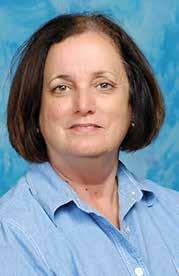

Following a distinguished 41-year career in music education, Cynthia Berry retired from Seminole County Public Schools in 2015. Since relocating to South Florida, she has maintained an active schedule through her work as an adjudicator and clinician. In addition to her service with the Florida Bandmasters Association, she is the assistant conductor of the Broward Concert Band and volunteers with the New River Community Orchestra. We sat down to discuss ways for music educators to move forward following the continuing challenges from the COVID-19 pandemic.
Each year you travel across the state working with students and teachers. You have seen the challenges music educators face. What insight would you provide teachers?
Teachers are tired—but teachers keep giving. I think educators should give themselves a break. Our professional events and school dynamics are not the same. Our students are not the same. It will be a long time before things are “normal”—whatever that means. However, I think we should work to give our students the best classroom experiences possible. Checklists are not as important as experiences. You can check off everything on your list and still have a poor result. So what if you don’t go to a contest or go on a trip? You can still create meaning in the
continued on page 18
classroom without these things. In some ways we have all felt like first-year teachers again … with no mentors to guide us. This might seem scary, but we are moving through the lingering effects of the crisis and related struggles. COVID has created some strange moments for music educators (and the world), but we are not locked into these moments. We moved forward during the pandemic, and we continue to do so.
What support strategies would you suggest for teachers?
We need to connect. It’s simple. We need to connect with each other—beyond district meetings or a convention. We need to connect with as many people as possible. The isolation from COVID has lingered. We are not always conditioned to reach out … but we must do this! We need to connect socially and emotionally. It’s not just about asking what your group is playing at MPA. We are people first. Lean on your friends. They are there for you. You need to be there for them. Go to hear live music. I’m serious. Hear how sounds and colors blend. Everyone brings different perspectives to music making and music listening. Experiencing and sharing these moments is important.
The grind is real. Burnout is real. Folks are considering other professional avenues. This issue goes beyond music education, of course, but for teachers struggling to find the joy or passion, what would you suggest?
Music educators reinvent themselves every year. We do. Look at your situation and analyze what is going well and what is not. What are you putting in and what is the outcome? Do not be afraid to make changes to your practices. If you modify how you teach, this will impact how students learn. What worked in 2002 will not work in 2025. We are a creative profession. We now get to show what this looks like in new ways.
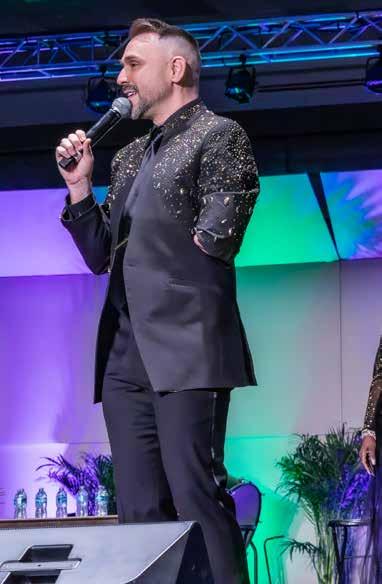
For teachers looking to rebuild a program, what insight can you offer?
Some aspects of culture will remain. I think we should ask what we should keep—what keeps going, and then, what should we remove. We have three things: Tradition – environment – attitude. What can we do with these? There are great kids at every school. There is potential everywhere! Molding that potential is the job of an expert teacher. Make opportunities out of situations that are not ideal. We are no longer in isolation. Different is OK. How can we do different, better?
Many current college students had their high school years disrupted and are now planning to enter a professional world that looks and feels different than what they experienced. How would you help them create a healthy mindset?
We all should remember we entered this profession because it brought us joy, music carries purpose, and


it connects us to others. We need to continue to engage. Young teachers need to connect with experienced professionals. Relationship building for professionals is essential, not just transactional moments—“Can I borrow this piece?”—but supportive friendships. In the classroom, you need to know your students and people and not just a 2nd violin, etc. I made great efforts to ensure I knew at least one nonmusical, non-class related thing about my students. They knew I was engaged with them. This is not musical work, but it is essential in my opinion.
We have talked about work and home balance. How has this changed for you in retirement, and what can you share for folks that might struggle with balance?
I think it’s important to work hard, knowing there will be some long days during certain parts of the year. However, when it’s time to go home, do just that: GO HOME. The work will be right where you left it. I never viewed my job as work because I loved what I did; I still do. Having space and time to breathe and recharge is important for short-term and long-term resilience.
As we continue to navigate the changing landscape of our classrooms, we should remind ourselves that the learning activities we offer our students are unlike anything else in their schooling experience. Music spaces are not only valuable because of the nature of our art form, but also because we offer space for students to explore their own ideas and vulnerabilities. In the words of Waller (2001): “Resilience is not the lack of vulnerability.” Rather, because resilience is multidimensional, vulnerability is a part of this ecosystem.
David M. Hedgecoth serves as associate director and chair of undergraduate studies in the School of Music at The Ohio State University. He leads courses in undergraduate and graduate music education and is the resident director of the Brazilian Experience Education Abroad program.
Reference


Waller, M. Resilience in ecosystemic context: evolution of the concept. American Journal of Orthopsychiatry, 71(3), 290–297. https://doi.org/10.1037/0002-9432.71.3.290. PMID: 11495331.
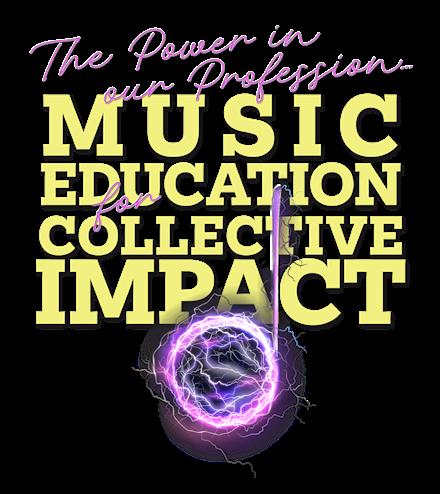

The theme for the 2026 conference is The Power in Our Profession: Music Education for Collective Impact. Collective Impact is a broad cross-sector coordination toward a mutual cause. It is a network of community members, organizations, and institutions that advance a cause by learning together, aligning, and integrating their actions to achieve systems-level change.
We prefer that your proposal connect to the conference theme for an overall uniformity of vision, but our primary goal will be to equip and empower music educators to best serve their students and the profession. All session proposal submissions should be consistent with current educational trends, promote curricular experiences that lead to a better cultural understanding, and allow educators to create, perform, and respond to music that instills lifelong values for learning and participation.
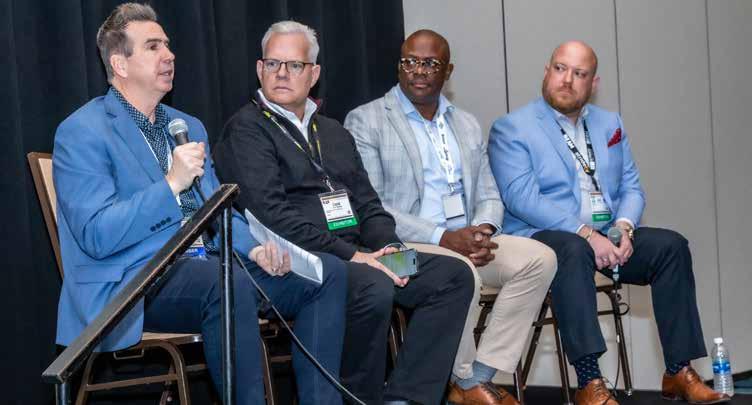
You are only permitted to submit a total of two (2) session proposals. Performance applications and product showcase proposals do not count toward this limit.
w Session Proposals: Friday, May 9, 2025
w Performance Applications: Friday, May 9, 2025
w Industry Product Showcase Proposals: July 15, 2025
Late submissions will not be accepted, so please plan accordingly.
w All presenters must register for the conference, even if they live or teach outside Florida. Early registration will begin in late September, and prices will increase in early December. Conference exhibitors working their booths and invited keynote speakers are exempt from this requirement.
w By submitting a proposal, you agree to register and attend in person to present your session if your proposal is selected. Please do not submit a proposal if you are unsure if you will be available to travel to Tampa during any of the dates of this conference. Cancellations for reasons other than unavoidable emergencies may affect the committee’s decision to accept future proposals.
w All presenters and conductors who live or teach in Florida must be members of FMEA and NAfME, the National Association for Music Education.
w Presenters residing outside of Florida must be members of NAfME. Attendees residing outside the United States are exempt from the NAfME membership requirement and should contact josh@fmea.org for instructions on how to create a login account to submit a proposal and register for the conference.
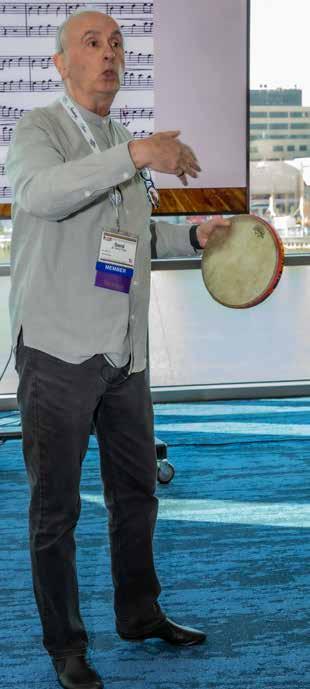
w Your FMEA and/or NAfME membership must be current to submit a proposal and must also be current when registering for the conference.
w You may join or renew your FMEA membership at FMEA.org/membership or visit NAfME.org if you reside outside of Florida. If you are not a current member, we began accepting new memberships and renewals for the 2025-26 school year on April 1.
w Conference exhibitors are exempt from FMEA and NAfME membership requirements but must contract and pay the deposit to exhibit before submitting a proposal.
continued on page 22
continued from page 21

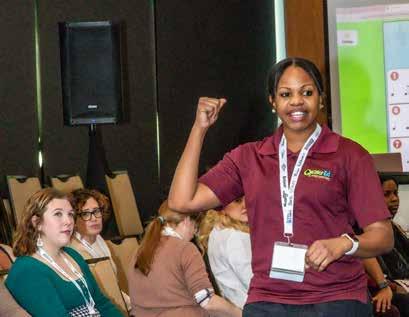
w FMEA will provide a microphone, sound system, and LCD projector. Upon approval of your session, a piano may be requested. You must plan on providing everything else needed for your presentation.
w Instruments, computers, music stands, and anything else not listed in the above bullet point is the presenter’s responsibility and will not be provided by FMEA. Choral risers are not allowed in session rooms.
w Complimentary Wi-Fi is provided in the Tampa Convention Center but not in the Marriott meeting rooms.
If you anticipate using student performers as a demonstration group for your session, you must select “Demonstration” as the session format when completing your proposal.
w It is recommended that demonstration ensembles be limited to 15 students or fewer. Ensembles of more than 15 students will still be considered, but available space will be a contributing factor when the committee decides on sessions to accept.
w If you are not the director or teacher of the student performers in the demonstration ensemble, their teacher/director must be added as a clinician for the session and register for the conference. They will be responsible for ordering name badges for the students as part of their conference registration.
w FMEA does not provide instruments, music stands, or any other equipment for demonstration groups other than chairs and a P.A. system.
w Choral risers are not allowed in the session presentation rooms.
Presenters are responsible for all expenses, including but not limited to travel, hotel, meals, conference registration, and materials.
Ensemble applications should only be submitted by the primary conductor/director from their own FMEA account. Assistant directors can be added after the initial application is completed. The application must include:
w Full name of the ensemble, including the school name if applicable
w Concert type
Concert: 25-minute formal concert performance on stage in a ballroom. These are usually, but not limited to, large concert ensembles such as a concert band, concert chorus, or symphony orchestra, but other large, “nontraditional” ensembles are also encouraged to apply.
Mini-Concert: 25-minute informal concert performance on the lobby stage on the second-floor veranda. These are usually smaller ensembles (approximately 20 students or fewer), such as a jazz ensemble, combo, small chorus, string ensemble, percussion ensemble, steel band, Orff ensemble, etc.
w Description or biographical sketch of the ensemble in 1,000 characters or fewer.
w Biographical sketch and a professional headshot photograph of each director.
w Names and email addresses of two (2) professional references who can speak to your qualifications. References will be automatically emailed from our system with a link to submit feedback, so please notify them in advance and make sure you have their correct email address.
w Social media (optional): If you would like us to include links to your social media in our online schedule and mobile app, you may copy and paste the URL addresses to your profiles on Facebook, Instagram, Pinterest, LinkedIn, and/or your website or blog. For example: instagram.com/flmusiced
w An mp3 recording of a recent live performance of one (1) piece of music or one (1) movement of a larger work that demonstrates the ensemble’s technical and musical ability. It must be only one (1) file in MP3 format with the “.mp3” file extension and be no larger than 20 megabytes.
w A letter of permission from the performing students’ school principal or administrator giving permission for the students to travel to Tampa and perform at the

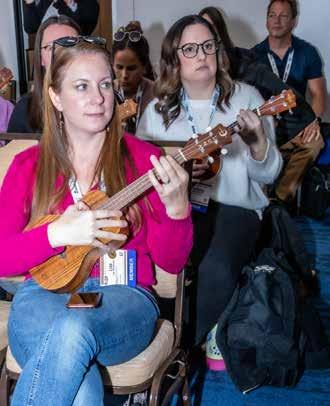
conference. It must be signed and scanned as a PDF file with the “.pdf” file extension.
w A professional photograph of the ensemble in JPG, JPEG, or PNG format.
Students and chaperones: Directors of accepted performing ensembles and demonstration groups are responsible for adding their student and chaperone lists to their conference registration before the early registration deadline in December. Only one (1) chaperone per six (6) students is allowed.
A Product Showcase Session is a one-hour presentation of your organization’s products or services open to the general membership. It is held in an on-site conference room and listed in the conference program. Organizations may pass out any material they wish at these sessions but cannot serve food or beverages.
Exhibiting companies are encouraged to submit proposals as Product Showcases but are also welcome to submit regular educational sessions. However, the FMEA Conference Planning Committee reserves the right to deny any regular session proposal and change it into a Product Showcase proposal if they suspect that specific products or services will be promoted during the session. If one of the purposes of your session is to sell or promote a product, service, company, or organization, it must be designated as a Product Showcase session.
The deadline for Product Showcase Session Proposals is July 15, 2025.
Showcase
w $500
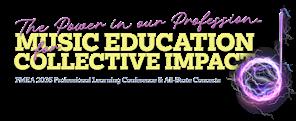
w $350 for Bronze Corporate Partner members
w $250 for Silver Corporate Partner members
w Free for Gold Corporate Partner members (limit one complimentary session, $250 for a second session if approved)
w Piano rental or additional A/V equipment may incur an additional cost and must be requested upon acceptance.
w The company must first sign up as an exhibitor, pay the required deposit, and complete the electronic exhibitor contract.
w Corporate or Academic Partner members will be given priority acceptance for Product Showcase events, the reduced Showcase prices listed above, and an exhibit booth discount. Membership must be current for at least two years to qualify for this priority status. Although not guaranteed, we will make every effort to approve at least one Showcase event yearly for Gold Partners and at least one every three years for Silver and Bronze Partners.
w See the required materials listed above for session and presenter information that must be copied-and-pasted or uploaded into the application.
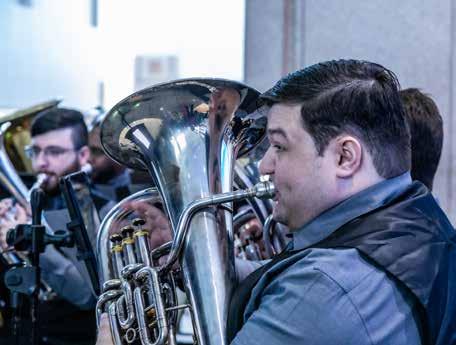
Greetings, everyone.
I am Jason Lane, a third-year music education scholar from Florida A & M University, and I proudly serve as the new president of Florida NAfME Collegiate. As the semester ends, I’d like to reflect on our growth and accomplishments. It brings me great joy to see how NAfME Collegiate has expanded, fostering meaningful connections between chapters and elevating the standard of music education. I admire the dedication of my fellow students who apply their classroom knowledge to the field, creating positive learning environments and stronger communities.
One of the most impactful aspects of my NAfME Collegiate experience was attending workshops and conferences like Fall Conference (UNF) and FMEA. These events provided valuable insight into teaching methodologies, classroom management, and music education advocacy. Learning from experienced educators inspired me with


fresh perspectives and a renewed passion for my future career. Additionally, NAfME Collegiate cultivated a strong sense of community among aspiring music educators. Engaging in discussions and collaborations with my peers reinforced the importance of a professional network that will continue to support and inspire me.
This past year also provided hands-on teaching experiences, allowing me to apply my learning in realworld settings. Volunteering at local schools, leading small ensembles, and assisting in workshops strengthened my confidence and affirmed my dedication to music education. These opportunities reminded me of the importance of direct engagement and mentorship in shaping young musicians’ lives.
As I reflect, I want to
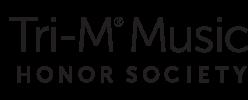
Jason Lane President

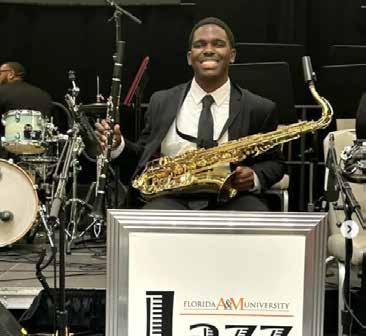
acknowledge the seniors who have dedicated four years to their chapters. To them, I say, “Thank you.” Your commitment to raising the standards of music education advocacy has paved the way for future educators. I am incredibly grateful for the knowledge, experiences, and relationships I have gained from you all, and I look forward to working with you once again as I continue my journey.
Moving forward into the summer and fall semesters,
Join the only national music honor society for students in grades 6-12
Learn more about this program: nafme.org/Tri-M Contact us: Tri-M@nafme.org
I plan to remain optimistic about the future plans of Florida NAfME Collegiate. The foundation our past executive boards have built over the years serve as stepping stones for continued growth. Through ongoing learning, networking, and advocacy, we are committed to making a lasting impact in music education and inspiring the next generation of musicians. We are the future.
Go, Florida NAfME Collegiate!

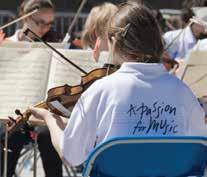

Mark A. Belfast, Jr., PhD Advisor
In2007, the world was introduced to two young entrepreneurs, and burgeoning engineers, who were faced with what they deemed “the annual problem for our generation”—determining how to best spend our time. For the next eight years, we watched as those young men accomplished AMAZING things! They built a rocket, climbed the Eiffel Tower, and discovered things we didn’t know existed. They worked with primates, experienced tidal waves, and even developed nanobots, all on a shoestring budget! What made them so incredible was not the things they accomplished, but the way they approached the problems they faced. They were resilient and truly believed there was always a way to overcome adversity. If a tool or path wasn’t readily available, they created one! They were visionaries who understood the only way to improve their lives was to reject the status quo. They gave themselves permission to dream and then actively pursued those dreams
until they were realized. Most importantly, they did it together. They focused on adding value to their lives and the lives of their loved ones. They depended upon each other’s skills and strengths, and when that wasn’t enough, they depend ed on others with whom they had developed meaningful relationships.

This summer, we find ourselves in an interesting situation. Plans are afoot to dismantle the U.S. Department of Education, and many of you have questions about what that means for NAfME, FMEA, and teachers nationwide. I assure you, your concerns are shared by many! Nevertheless, there are far too many variables at play to (1) know if the proposed plans will come to fruition, and (2) fully understand the impact of such unprecedented changes to our education system.
So, what does that mean for you? It means now’s a great time to reflect on the philosophy of those young entrepreneurs we first met
nearly 18 years ago. It means we ought to consider how we’re spending our time, and ensure the choices we make result in added value to our lives and the lives of others. It means we ought to give ourselves permission to dream and pursue those dreams, incessantly, despite the challenges we face. It means when obstacles seem insurmountable, we ought to depend on cultivated relationships to find the support and encouragement we need to persevere. Most of all, as you can see, it means there’s a whole lot of stuff to do before school starts this fall!
Rest assured, NAfME, FMEA, and Florida NAfME Collegiate are here for
you, so lean in. Keep an eye on your email, as well as NAfME, FMEA, and Florida NAfME Collegiate social media accounts, for important events (e.g., CLAS1) and updates throughout the summer. Oh, and about those two young men, I’m excited to say Phineas and Ferb2 are set to return with all new adventures this June! I know I’ll be watching. How will you spend your summer? Hey, where’s Perry?
1 The 2025 NAfME Collegiate Leadership Advocacy Summit will be held June 9-11 in Reston, Va. Learn more at https://nafme. org/advocacy/nafme-collegiatesummit/.
2 You can view a trailer of the new Phineas and Ferb season at https://youtu.be/pj7aDHPfzZU.

MULTICULTURAL NETWORK
Arnekua Jackson, PhD Chairperson
s the school year winds down, music educators across Florida are preparing for final concerts, assessments, and celebrations of student growth. This time of year is filled with rehearsals, lastminute adjustments, and the rush to bring everything together. While it can feel overwhelming, remember that every note sung, every
instrument played, and every lesson taught has contributed to the musical journey of your students. Take a moment to reflect on their progress—not just in technical skills, but in confidence, teamwork, and passion for music. The seeds you have planted throughout the year are blooming, and that is something to be proud of.
Amid the hustle, don’t forget to encourage yourself. Teaching music is both an art and a labor of love, and you have given your students an incredible gift. Breathe deeply, give yourself grace, and embrace the joy in these final moments of the year. Whether the concert is perfect or has a few unexpected surprises, know that your impact goes


beyond a single performance. You have nurtured young musicians, created lasting memories, and inspired futures. As you close this chapter and begin thinking ahead, celebrate your dedication, your resilience, and the power of music
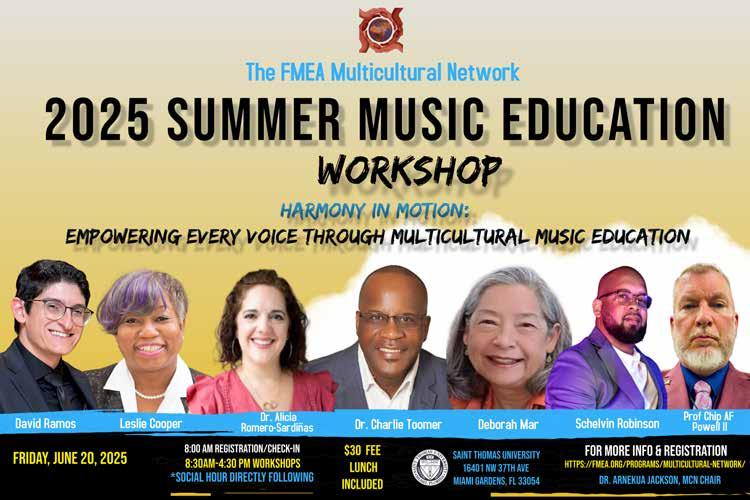
education. You are making a difference—one note at a time.
As you reflect on the year’s accomplishments, consider the ways you can continue growing as an educator and fostering a more inclusive musical environment for your students. Beyond performances, spring is a time to explore new opportunities that embrace cultural diversity in music education. The upcoming Multicultural Network (MCN) Summer Workshop at St. Thomas University in Miami Gardens, Florida, offers a chance to engage with expert guidance, handson experiences, and valuable resources on integrating diverse musical traditions into your curriculum. Join us on June 20, 2025, for this enriching one-day event. For just $30, attendees will gain practical strategies to celebrate and incorporate a variety of cultural influences in their teaching.
Take this opportunity to refresh, re-energize, and inspire both yourself and your students.
Register now and be part of a movement that fosters more inclusive and globally inspired music classrooms!
Christopher Burns, PhD President

s I prepare to conclude my term, I am filled with pride and gratitude for the incredible journey we have shared during my time as president of the Florida Music Supervision Association. The past two years have been a symphony of achievements, challenges, and unwavering dedication to music education across our state.
One of the most inspiring highlights has been witnessing the passion and commitment of our future music educators. Their energy and innovative ideas, showcased at the FMEA Professional Learning Conference, reaffirm my belief in the bright future of music education in Florida. These emerging professionals are not just entering the field; they are poised to transform it, bringing fresh perspectives and a deep commitment to nurturing the next generation of musicians.
To ensure a vibrant future for music education, it is crucial that we foster collaboration at all levels. I encourage districts with and without supervisors to connect, share resources, and learn from each other. Our recently updated FMSA website, with its interactive map, is a valuable tool for facilitating these connections. By working together, we can ensure that every student in Florida has access to quality music education.
I am also thrilled to celebrate the ongoing success of the Florida Seal of Fine Arts. This prestigious recognition, established by House Bill 523, highlights the exceptional achievements of our high school graduates in music, dance, theatre, and visual arts. The Seal of Fine Arts is a testament to the rigorous standards and outstanding quality of arts education in Florida, and I urge educators to continue supporting and promoting this valuable program. Check out more information on the seal from Jeanne Reynolds and the Advocacy Committee.
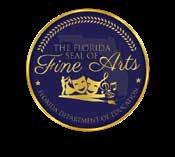
As my term draws to a close, I extend my sincere gratitude to all of you—the dedicated music educators, supervisors, and advocates who work tirelessly to make a difference in the lives of our students. Your passion, creativity, and resilience inspire me every day.
I am also delighted to congratulate John Dupuis from Volusia County, the incoming president for the Florida Music Supervision Association. John is a passionate and experienced leader, and I am confident he will guide FMSA to even greater heights. I wish him all the best in his new role.
Reflecting on my time as president, I am reminded that music education is more than just teaching notes and rhythms. We are cultivating creativity, building confidence, and providing students with a powerful means of self-expression. In an ever-changing world, music remains a vital pathway for emotional intelligence, cultural understanding, and personal growth.
Thank you for allowing me to serve as your president. It has been an honor and a privilege. Let us continue to stay inspired, stay connected, and keep making music together.
This on-going column seeks to stimulate awareness of research issues for FMEA teachers and researchers.
William I. Bauer, PhD Chairperson, University of Florida

BY STACEY SWANSON
Every detective needs the right tools for the job, and the same is true for researchers. Just as crime scene investigators use different tools to collect various types of evidence— from fingerprint dust to DNA swabs—researchers need different measurement tools to gather various types of data. Once the evidence is collected, sophisticated analytical techniques help us make sense of what we’ve found and determine whether our suspicions are supported by the evidence.
Think about walking into a crime scene. Some evidence you’ll simply categorize (like types of items disturbed), some you’ll rank (like priority of clues), and some you’ll measure precisely (like time of crime). These different approaches to measuring evidence parallel the four levels of measurement in research: nominal, ordinal, interval, and ratio.
w Types of breakfast items stolen (cereals, fruits, dairy products)
w School locations (downtown, suburban, rural areas)
w Days when thefts occur (Monday through Friday)

Moving up in complexity, ordinal measurement allows us to rank our categories in order, like arranging suspects from most to least suspicious. While we can say one rank is higher than another, we can’t specify exactly how much higher—we just know the order. In our investigation, we use ordinal measurement to track:
w Severity of breakfast theft incidents (minor, moderate, major)
w Impact on student performance (low, medium, high impact)
w Case priority levels (low, medium, high priority)
The most basic form of measurement is simply putting things into categories. In traditional research terms, nominal measurement involves naming categories without any implied order or ranking. It’s like organizing evidence into different boxes—each box is different, but no box is “more” than another.
Consider our current investigation. When we categorize our school crime suspects, we might have the Breakfast Bandit, the Homework Hooligan, and the Tardy Trickster. These names help us organize our investigation, but we can’t say one suspect is “greater” than another—they’re simply different categories. In the Breakfast Bandit case, we use nominal measurement to track:
The most sophisticated tools in our detective kit are interval and ratio measurements. These allow us to make precise measurements and understand the exact differences between values.
Interval measurement is like measuring the time between crimes. The difference between 2:00 and 3:00 is the same as the difference between 3:00 and 4:00, but 0:00 doesn’t mean “no time.”
In our investigation, we use interval measurement for:
w Test score changes (the difference between 80 and 90 equals the difference between 90 and 100)
w Time patterns of theft (measured in hours)
w Student satisfaction ratings on a scale
Ratio measurement is like counting stolen granola bars—zero means truly none and ten bars is twice as many as five bars.
We use ratio measurement for:
w Number of breakfast items stolen
w Student attendance counts
w Cost of stolen items in dollars
Just as detectives use different investigative techniques depending on the crime, researchers employ various statistical tests based on their research questions. Understanding which statistical tool to use is akin to knowing whether to obtain fingerprints or to review security camera footage. The right technique for the right situation makes all the difference.
Think of a t-test as comparing two crime scenes or two groups of suspects. It’s a statistical way of asking, “Is there a meaningful difference between these two cases?” In simple research language, a t-test is designed to find out if the difference that exists between two groups is statistically significant. It serves something similar to the purposes of a lie detector—it tests the truthfulness of the differences we see.
Consider our Breakfast Bandit investigation. When we compare test scores between students who had breakfast stolen versus those who didn’t, we turn to the t-test. If average test scores in affected schools are 75% while unaffected schools average 82%, a t-test helps us determine if this difference is statistically significant or might have occurred by chance.
Sometimes an investigation requires us to work with more than two groups of subjects. This is where ANOVA (Analysis of Variance) comes into play. Think of it as comparing multiple crime scenes or suspect groups simultaneously.
In our Breakfast Bandit investigation, we’re comparing multiple school clusters at once, each with different breakfast programs. Some schools have hot breakfast programs, some have grab-and-go options, some provide in-classroom breakfast, and some still maintain the traditional way of serving breakfast in the cafeteria.
For instance, when we discover that hot breakfast schools average 45 items stolen, grab-and-go schools 30 items, in-classroom schools 20 items, and cafeteria schools 40 items, ANOVA tells us if these differences are meaningful or just random variations. This helps us identify if certain types of breakfast programs are more vulnerable to our culprit.

Sometimes we need to predict future crimes based on patterns we’ve observed. This is where correlation and regression analysis come into play. Correlation measures the strength of a relationship between two pieces of evidence while regression allows us to predict one based on the other.
For example, we might discover a correlation between the number of breakfast items stolen and the drop in test scores. Regression analysis takes this further—if we know the Bandit stole 50 breakfast items from a school, we might predict that the average test score in that school will drop by 7 points.
This predictive power helps us:
w Anticipate potential academic impacts from future thefts
w Allocate resources effectively to schools most at risk
w Develop preventive measures based on past patterns
Statistical significance tells us to what extent we can be certain that our outcome is not just random chance. Much like a detective needs strong evidence to build a case, researchers need statistically significant results to draw valid conclusions.
As we’ve journeyed through this two-part exploration of research methods, we’ve followed the Breakfast Bandit in a trial that has illuminated how, much like finely trained detectives, researchers meticulously peel back layers in their work to derive truth and meaning.
This is exactly what the case of the Breakfast Bandit demonstrates. Whether investigating missing breakfast or conducting an academic study, the process remains the same:
w The question must be focused on key areas of concern
w Evidence must be collected in the form of properly measured data
w Analysis must be thorough and appropriate to the type of data collected
As you set forth into your investigations, remember that research is detective work, but from a more rigorous perspective. It is both an art and a science that involves careful planning, systematic methods, and precise analysis—all necessary to transform curiosity into discovery.
Swanson is a PhD student at the University of Miami.

BY LISA LANGSTON
Is there any more divisive teaching tool in an elementary music educator’s arsenal than recorder? The recorder is beloved by some but more often used as a punch line when it comes to the elemen-
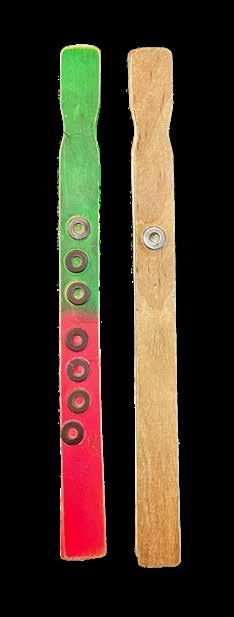
graders in January because that’s when I think they have both the finger dexterity and breath control to make a go of it. I’ll be honest, though, the first lessons of making sounds on recorder were not always my favorite teaching days. In past years it would take at least four to six recorder lessons to get an entire class to make the correct sound. That changed

In 2021, when it was time to start recorder instruction, COVID
wanted to proceed with however, I also wanted to protect myself and my community. I decided to start with my “recorder
trainers are paint stirring sticks that have washers
recorder holes go. In the past I would use these for a lesson or two and then move to the sounding recorders. COVID made blowing
dangerous, so during January, or four lessons, we would practice just getting our fingers into place, work
DIVERSE LEARNERS COMMITTEE
Christine Lapka, EdD Chairperson


on finger isolation, and naming the finger positions with their corresponding letter name. Five to ten minutes each week was all we did before moving on to another “safe” option like boomwackers or bucket drums.
February brought a downtick of COVID cases, so we began to play outside. This was a game changer for my program. Within two or three outside lessons, a majority of third graders could play B, A, G, and E. I’ve done a lot of thinking about why taking children outside for their first collective sounds makes them
“get it” faster. Putting them six feet apart and outside gave them the ability to hear themselves. Why do they overblow? They are trying to hear themselves. Going outside gave them the ability to explore both incorrect and correct breath control. They also weren’t fighting their fingers. The paint stick finger trainers had done their job. Fast forward to FMEA 2024. I purchased a class set of Nuvo recorders. This purchase has been transformative for many of my students. If you are not familiar with this brand, they have a set of silicone
finger pads that make sealing the recorder holes so much easier. This year I’ve started all the third graders on these Nuvo recorders. The children immediately use the correct air. For my ESE students, I have not needed to tape up any holes to ensure a sealed recorder. If they get their fingers on the silicone buttons, they can do it on their own.
I’m so excited to see how this plays out for my students in the next few months. One thing is for certain, though: this will be the spring of the most beautiful Hot Cross Buns any of my families have ever experienced.
Have no plans this summer?
Attend one of these professional learning conferences for summer education and fellowship.
Multicultural Network Summer Workshop ...............
St. Thomas University, 16401 NW 37th Avenue, Miami Gardens, Florida
June 20
For more information and registration: FMEA.org/programs/multicultural-network
Teach Music Florida Coalition formerly Summer Institute Think Tank .........................
June 24-26
Omni Orlando Resort at ChampionsGate, 1500 Masters Blvd., ChampionsGate, Florida By application/invitation: FMEA.org/programs/summer-institute
Emerging Leaders Workshop ............................
Omni Orlando Resort at ChampionsGate, 1500 Masters Blvd., ChampionsGate, Florida
June 27
For information: Dr. Dré Graham, dregraham@gmail.com
FBA Summer Professional

Lisa Langston , an Orff-certified teacher, is a 30-year veteran music educator who has taught in Seminole County for the last 26 years. She is an active member of the Florida Music Education Association and Central Florida Orff Chapter. In recent years, she has been an all-county clinician throughout Central Florida and has presented clinics in Florida and Arizona. In addition to her elementary music position, she is the music director at Tuskawilla Presbyterian Church in Oviedo.
Development Conference ................................
July 9-11
DoubleTree by Hilton Orlando at SeaWorld, 10100 International Drive, Orlando, Florida fba.flmusiced.org/for-directors/summer-conference
FVA Summer Professional
Development Conference ..............................
Hilton Orlando/Altamonte Springs, 350 Northlake Blvd., Altamonte Springs, Florida
Please note: There are separate registrations for Summer Conference, Choral Panorama, and the Adjudicator Training Session. fva.net/summer
July 23-25
Oneof the most visible func tions of the FMEA Student Engagement Committee is to provide high-quality experiences for stu dents at our annual conference. Student engagement, howev er, is most important at the local level, in the classroom. Did you know that class room management is one of the most cited reasons why young teachers leave the profession? Classroom management is the one thing that affects all other aspects of what we do, including pedagogy and artistry. Real artistry in the classroom cannot occur without engagement. For years, conversations about classroom management were centered on compliance. How did the teacher enforce rules and administer consequences? This reactive approach to classroom management can be frustrating and exhausting. Modern classroom management is proactive and centered on engagement. Compliance is not enough; engagement is key. Here are some things that can foster an engaged classroom:

are very few emergencies in education. Emails and paperwork can wait. Interact with students from bell to bell. Be prepared ahead of time (planning, score study, etc.) so your students get your undivided attention.
The use of specific and timely feedback is one of the greatest tools to keep students engaged.
Michael Antmann, EdD Chairperson
observe other teachers, or sit in on a room at solo and ensemble MPA. Write down examples of good feedback, and make yourself a bank of example

facilitates real learning. What can we do to build healthy, appropriate relationships with students? Greet students at the door and engage them in conversation. Use (appropriate) humor, but avoid sarcasm. Not all students process sarcasm the same way, and it can be isolating.
Be present. There is nothing more important than what is going on in the classroom! Engagement is
When you stop in rehearsal, be sure you have something important to say. Avoid non-specific feedback (e.g., “Nice.”) or generic instructions without guidance (e.g., “Do it again.”). If you want them to play it again, tell them why, and then address it immediately after they perform the section. This can be difficult if you are a beginning or young teacher, but it’s still essential. Go
Clear, consistent routines and procedures provide safety and stability. Students should know what to expect when they enter your room, and they should know what’s happening next. Beware of “warm-ups” that are automated and don’t require your attention. Do have a consistent, predictable routine, but do not forget this is the most important part of class. This is where the most important learning takes place. Have a routine, but make alterations to complexity and difficulty. This allows you to “say less.” How many of your words are devoted to music? It’s also important to have consistent expectations for all of your students. Kids realize it when you give up on them; the other kids notice it, too.
The student-teacher relationship is a major factor in student achievement. Connection is essential for communication and
This is essential to molding and managing student discipline, behaviors, and engagement. Don’t miss an opportunity to praise a student who is a positive example. This encourages the student to continue these behaviors, and it encourages others to follow the example; all humans want approval. What if they are off-task? Use nonverbal cues, when possible, to redirect undesirable behaviors, but immediately follow up with positive reinforcement when they do better. Proximity, eye contact, smiles, etc., are more powerful than words.
In an engaged classroom, students feel safe and are more likely to participate. It fosters intrinsic motivation; students will be eager to interact with the content and to contribute to the class. Most importantly, a focus on engagement can lead to more positive experiences for both the students and the teacher.

Sondra A. W. Collins Chairperson
s we wrap up another school year of quality music education, I applaud all music educators for promoting and exemplifying quality music education on a daily basis. YOU are a music education hero, rising above and being the light for all of your students!
Speaking of heroes, it’s that time of year when I ask you to consider who in your sphere of influence is deserving of recognition by the FMEA Awards Program. The all-call for nominations begins now! Visit FMEA.org/programs/ awards to learn more.
In the coming months I will continue to share with you a little of the brilliance that our awardees have to offer you, speaking their truth about music education and the passion that drives them. These words of inspiration I share with you to give you that confidence to be the light to your own students, as well as the drive to help shine a light on others in our next nomination period.
Here is your monthly dose of inspiration, inspiring through words of connection, from our 2025 FMEA Secondary Music Educator of the Year, Mara Rose Bruce, retired secondary music educator from Fleming Island High School in Clay County District Schools:
MARA ROSE BRUCE
2025 FMEA Secondary Music Educator of the Year
T“Throughout my career, my number one goal has always been to make good people. I am a music educator because of my love for students and my love for music, and what better way to teach students about life, than through music. I am incredibly honored to have received the Secondary Music Educator of the Year award. I remember being at Florida State University as a freshman, being in symphonic band with Dr. Jim Croft. At the beginning of rehearsal one day, he came in with this picture, and it was a picture of the very first band he ever taught. He was able to go through and point at every student and tell us where they were in their lives at that point in time, which was many years forward. That stuck with me. He showed me that music was not just about the subject, and teaching was not just about the subject, but about people. It’s about communication. It’s about connection. It’s about relationships. And that has stuck with me as I have taught throughout the last 30 years.
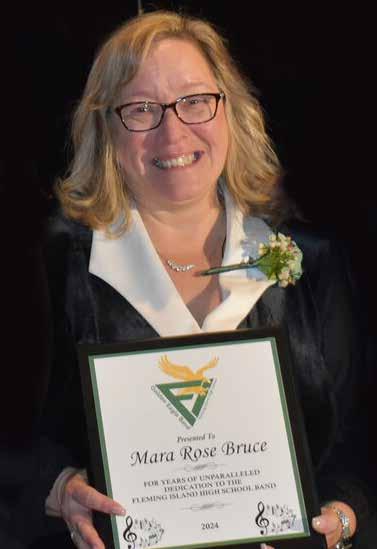
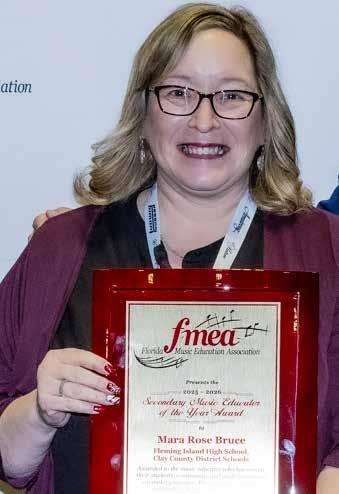
One of the things that makes me most proud about this award is that it represents all of the work that my students have done. Over the years, my students have shown me what their incredible capacity for learning can be. They will start at the beginning of the year, and they will have real trouble working together as an ensemble. As we go through the rest of the semester and then into the next semester, they really gel as a group and a unit that works together and feeds off of each other to create incredible music.
I want to thank the FMEA and the FBA for always being an advocate for music education. Music education gives students an outlet to be able to be creative and to be able to be emotional, in a safe space. It is a way for them to use leadership skills. It is a way for them to learn leadership skills. It is a way for them to be sure that they can have a safe space to have emotions, and learn how to deal with those emotions. If music in our schools did not exist, that home would go away. The feeling that students get in a band room, a music class, an orchestra room, a chorus room cannot be duplicated anywhere else.
As I look back on the last 30 years of my career, I am going to remember the people. I am going to remember the moments on stage making music. I am going to remember the relationships that I have had with other staff members, my teammates, my students, and the joy that we got creating music together.
To the FMEA: I want to thank you from the bottom of my heart. I am so honored to be able to represent you. I am so honored to be able to represent music education. And I am so honored to go out and speak positively about music education throughout the state of Florida.”
Thefinal weeks of the school year have always been my favorite time of year. After the culmination of music performance assessment, which often represents a significant milestone, the calendar remains full of engaging and celebratory activities that make this time so rewarding for both students and educators. This is the period when we are able to challenge our students with more complex and exciting music, providing them with opportunities to further develop their skills and to feel a sense of accomplishment in their progress. As we move toward the end of the year, the focus naturally shifts to auditions for next year’s ensembles. These auditions serve as a moment for students to showcase their growth over the past year and to set their sights on new goals and challenges for the following year.
In addition to auditions, this time of year also brings with it the excitement of endof-year awards, incentives, and banquets, where we have the opportunity to celebrate our students’ achievements and recognize the dedication and hard work they have invested throughout the school year. These events are not only a chance to highlight academic and musical accomplishments but also serve as an opportunity
to build community and strengthen the sense of belonging and camaraderie among students. Of course, this is also the time when exams loom on the horizon, requiring students to demonstrate their full understanding and mastery of the material they’ve learned throughout the year.
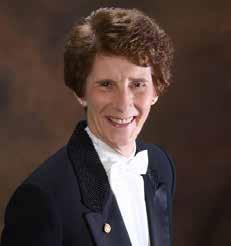
Jeff Cayer, EdD President

One of the aspects I truly enjoy during these final weeks is seeing the wave of “countdown to summer” posts across social media. There’s a sense of excitement as both students and teachers look forward to a muchneeded break. While the thought of summer vacation is certainly exciting, it is also critical that we, as educators, remain focused on maintaining momentum and ensuring that students finish strong. It is essential that, even in the midst of excitement about the upcoming summer, we maintain a sharp focus on both academic and personal growth, ensuring that learning continues to be engaging and enjoyable right up until the final bell rings.
As we look ahead to the summer, I highly encourage you to save the dates for an enriching professional development opportunity at the Summer Conference, which will take place July 9-11, 2025, at the DoubleTree by Hilton Orlando at
experience for music educators, offering not only inspiration but also practical tools and insights that can be applied to your teaching in the upcoming school year. We are excited to have Dr. Paula Crider as the keynote speaker for the conference. Dr. Crider is renowned for her ability to inspire and entertain audiences with her wealth of experience and insight into music education. Her sessions are always thought-provoking and motivational, leaving attendees feeling empowered and ready to implement new ideas into their teaching practice.
In addition to the keynote, the Summer Conference will feature a variety of engaging clinics, performances, and concerts, including the prestigious 7-Star Honor Band, conducted by Larry
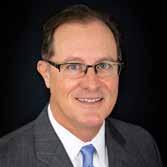
Clark, a composer and the owner of Excelcia Music Publishing. Mr. Clark’s vast knowledge of music and his experience as both a composer and an educator will make for a truly special experience for all involved. The conference will also showcase the 9-Star Honor Band, which will be conducted by Mara Rose Bruce, a respected retired

attendees the opportunity to hear exceptional student musicians perform and witness the magic of highlevel music education in action.
Here is an overview of the schedule of events for the Summer Conference: w Tuesday, July 8, Adjudication Training (requires separate registration), 7-Star Band Concert w Wednesday, July 9, 7-Star Band Concert and FBA Summer Conference Sessions w Thursday, July 10, 9-Star Honor Band Concert,
w Friday, July 11, FBA Jazz Institute
This conference offers an incredible opportunity to connect with fellow educators, to refine your teaching practice, and to gain new ideas that will enhance both your professional growth and your students’ musical experiences. I strongly encourage you to join us for this enriching event, which will undoubtedly leave you inspired and prepared to tackle the challenges of the coming school year.
As we enter these final weeks of school, let’s remain focused on the growth and success of our students while also taking the time to celebrate the many achievements we’ve witnessed throughout the year. These next few weeks are vital in ensuring that our students finish strong and with the right balance of challenge, support, and enjoyment. Summer is just around the corner—and with it, the perfect opportunity to recharge, reflect, and look ahead to another year of inspiring and educating young musicians.
Enjoy these last few weeks of the school year, and I look forward to seeing you at the Summer Conference in July!
FLORIDA ORCHESTRA ASSOCIATION
Laurie Bitters President

As the school year winds down, we find ourselves transitioning from the whirlwind of MPA season to the flurry of preparations for spring concerts, banquets, and yearend celebrations. It often feels like our work is never truly done! However, I want to take a moment to reflect on the incredible performances at state MPA. It was an honor to hear your orchestras and witness the dedication and artistry of our students and educators.
A special thank you goes to our esteemed state MPA concert judges and clinicians: Dr. Gail Barnes, Dr. Mark Laycock, Dr. BettyAnne Gottlieb, Dr. Rachel Dirks, and Dr. Kirk Moss. Your expertise and insights were invaluable, and I hope our students and directors gained meaningful wisdom from the experience. At FOA, our mission is to serve the needs of our outstanding students and educators, and we remain committed to fostering excellence in orchestral education.
As we wrap up this school year and begin planning for the next, I encourage you to mark your calendars for our much-anticipated Fall Conference in Orlando, taking place October 8-10, 2025. Given that last year’s conference was postponed, we are excited to present not one but two keynote speakers: Creston Herron and David Pope. This will be an inspiring event filled with opportunities for growth, collaboration, and celebration.

On a personal note, it is hard to believe that this is my final article as FOA president—well, at least I think it will be my last! I am incredibly proud of the direction FOA is taking as we continue advancing our mission. This past year has brought many changes, and I am grateful to have worked alongside such talented and dedicated colleagues. I extend my heartfelt thanks to everyone who contributed to making this year a success.
Though my term as president is ending, I look forward to continuing to serve as past president. I am eager to support our incoming FOA Executive Committee and welcome our new president, Andrea Szarowicz. As always, we value your input regarding conference planning and handbook updates. Please feel free to reach out to me or any board member with your thoughts, questions, or concerns.

As the academic year comes to a close, take a moment to reflect on the many successes you and your students have achieved. The impact we make as music educators is profound—we shape lives daily through the power of music. Thank you for allowing me the privilege to serve this incredible organization. Wishing you all a restful and rewarding summer break!
FLORIDA VOCAL ASSOCIATION
David Pletincks President

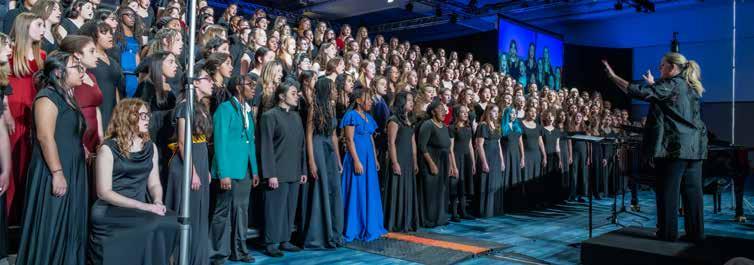
s my term as FVA president comes to a close, I want to take this opportunity to express my sincere gratitude to all the dedicated individuals who have made my time in this role a truly remarkable and rewarding experience. Being entrusted with the privilege of leading such an esteemed organization has been one of the highlights of my career in music education.
I have expressed before that the FVA has held a very dear place in my heart for 20 years. Since 2007, I have experienced the joy of watching my own children participate in all-state choirs throughout middle and high school—always a highlight of the year for me and my family. The Pletincks family has had the privilege of participating in every event the FVA has to offer. Over the past two decades, I have been blessed to work with some of
the finest people I know and have developed many of the dearest friendships of my life.
The FVA is so much more than a professional network; it is a community of passionate educators, musicians, and students who share an unwavering commitment to the choral arts. I have had the privilege of witnessing firsthand the impact of this community on the lives of those we serve. From fostering the growth of young vocal musicians to providing professional development for educators, FVA has remained at the forefront of music education in Florida.
I have been fortunate to benefit from the exceptional leadership of Jason Locker, who guided our association through the challenges of the pandemic, a time when the future was uncertain. Then, under the inspiring leadership of Jeannine
Stemmer, we moved forward seamlessly as we began to navigate our “new normal.”
The incredible leadership of Jason and Jeannine made the past two years far easier than they might have been.
As I have traveled around the state, I have been inspired by the incredible work our teachers and directors are doing in their classrooms and with their choirs. The dedication, creativity, and hard work of our members are the driving forces behind every all-state choir, every concert, and every student’s musical journey. Watching young educators embark on this rewarding career each year is truly exciting. We see them in January with their first all-state students, adjudicating their students in their first solo and ensemble experience, or leading their choirs on stage at MPA for the first time. I have always loved the genuine support
and encouragement this association fosters to help each other succeed and grow our programs.
I would also like to express my deep appreciation for the outstanding leadership and friendship of Mike Dye, the unwavering support of the FVA Executive Board, and the countless volunteers who have worked tirelessly behind the scenes to ensure our events run smoothly. Your dedication to the vision of FVA has been truly inspiring. As we step into this new chapter with Jeannine Stemmer as president and Jeffry Bogue as president-elect, I am filled with excitement for the future. Additionally, as we begin the transition of David Verdoni into the role of executive director, I have great confidence that the Florida Vocal Association will continue to thrive and grow in the years ahead.

Ashley Peek President
Contemplating summer just around the corner, I can’t help but feel that every year I’ve taught has gone by faster than the one before. We’ve all heard the saying “Time flies when you’re having fun,” and I believe our jobs as music educators truly embody that. Reflecting on the year presents itself as a whirlwind of joyous events. Heading into summer, let’s all
take time to reflect on the joys of the school year, remembering our “why” for teaching. Teachers, thank YOU for your dedication to bringing joy through music to our young Florida musicians.
As my term as FEMEA president comes to an end, I can truly say this time has flown by as well. It has been a true honor to serve FMEA, FEMEA, and you.

Between All-State, Regionals, Rising Stars, conference, and more, I’ve seen firsthand the incredible dedication of elementary music teachers in our state. It is inspiring and an honor to work alongside all of you.
I would like to thank Jason Locker, Val Anderson, Dr. Kathy Sanz, and the entire FMEA board for their leadership and support of FEMEA.
FEMEA board members, I am proud of what we’ve accomplished over the last two years, and I am immensely grateful for all of your time and effort devoted to our organization.
Thank you, Joani Slawson, for your guidance and direction as I stepped into
this role. Your support and encouragement have meant the world.
I’d be remiss if I didn’t thank Jennifer Sullivan for the countless things she’s done for FEMEA. Her dedication to our organization is unmatched, and her vision always steers us in the right direction for the good of our students.
I am excited about the future of FEMEA, pleased to continue serving as I transition to the role of past president, and know we are in great hands with Meghan Alfaro stepping into her presidency.
Teachers, I wish you the most joyous summer and start to your 2025-26 school year!



Please take time to thank and support our 2024-2025 Academic Partners.




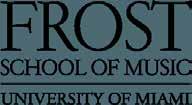





Florida Gulf Coast University
Florida Southern College
Mercer University
Rollins College Department of Music
Partners as of April 7, 2025.
University of North Florida
University of North Texas
The University of Tampa
*Please visit FMEA.org/partners for partnership details or call 850-878-6844.
President Jason P. Locker
Orange County Public Schools
445 W. Amelia St.; Orlando, FL 32801 (407) 317-3200; jasonlocker@fmea.org
Past President
Shelby R. Chipman, PhD
Florida A&M University, Department of Music Foster-Tanner Music Bldg., Room 318 Tallahassee, FL 32307; (850) 599-8165 shelby.chipman@famu.edu
President-Elect
Harry “Skip” Pardee, EdD
Collier County Public Schools 5775 Osceola Trail; Naples, FL 34109-0919 (239) 377-0087; pardeh@collierschools.com
FBA President Jeff Cayer, EdD president@fba.flmusiced.org
FCMEA President Sandra Sanchez Adorno, PhD
Florida International University 10910 SW 17 St.; Miami, FL 33199 sadorno@fiu.edu
FEMEA President Ashley Peek
Holley-Navarre Intermediate 1936 Navarre School Rd.; Navarre, FL 32566-7504 ashley@femea.flmusiced.org
Florida NAfME Collegiate President Jason Lane
Florida A&M University jason1.lane@famu.edu
FMSA President Christopher Burns, PhD School District of Osceola County (407) 870-4901; christopher.burns@osceolaschools.net
FOA President Laurie Bitters
Winter Park High School 2100 Summerfield Rd.; Winter Park, FL 32792 (407) 622-3200; laurie.bitters@gmail.com
FVA President David Pletincks
Powell Middle School 4100 Barclay Ave.; Brooksville, FL 34609-0860 (352) 403-8437; david@fva.net
Member-at-Large
Steven N. Kelly, PhD
Florida State University School of Music, KMU 330; Tallahassee, FL 32306 (850) 644-4069; skelly@fsu.edu
Historian/Parliamentarian & Executive Director Kathleen D. Sanz, PhD
Hinckley Center for Fine Arts Education 402 Office Plaza Dr.; Tallahassee, FL 32301-2757 (850) 878-6844; Fax: (850) 942-1793; kdsanz@fmea.org
Editor-in-Chief Kelly Miller, DMA
University of Central Florida; 12488 Centaurus Blvd.; Orlando, FL 32816-8009; (407) 823-4545; kelly.miller@ucf.edu
Conference Planning Committee Chairperson................. John K. Southall, PhD
Indian River State College; 3209 Virginia Ave.; Fort Pierce, FL 34981 (772) 418-9133; johnsouthall@me.com
FSMA President Benny L. Bolden, Jr., EdD laruemusic99@gmail.com
Hall of Fame Chairperson Mary Palmer, EdD (407) 252-5172; mpalmerassoc@aol.com
Florida NAfME Collegiate Advisor Mark A. Belfast, Jr., PhD (850) 644-3424; mbelfast@fsu.edu
FLORIDA COLLEGE MUSIC EDUCATORS ASSOCIATION
President Sandra Sanchez Adorno, PhD Florida International University; 10910 SW 17 St.; Miami, FL 33199 sadorno@fiu.edu
FLORIDA NAFME COLLEGIATE
President Jason Lane Florida A&M University; jason1.lane@famu.edu
FLORIDA MUSIC SUPERVISION ASSOCIATION
President Christopher Burns, PhD
School District of Osceola County (407) 870-4901; christopher.burns@osceolaschools.net
MULTICULTURAL NETWORK
Chairperson
Arnekua Jackson, PhD St. Thomas University arnekuajackson@gmail.com
COMMITTEES
Advocacy
Jeanne W. Reynolds (727) 744-7252; jeannewrey@gmail.com
Awards
Sondra A. W. Collins sondra.collins@marion.k12.fl.us
Budget/Finance, Development
Jason P. Locker Orange County Public Schools; 445 W. Amelia St.; Orlando, FL 32801 (407) 317-3200; jasonlocker@fmea.org
Contemporary Media
Clint Randles, PhD University of South Florida; 4202 E. Fowler Ave.; Tampa, FL 33620-9951 (813) 974-2311; randlesc@usf.edu
Diverse Learners
Christine Lapka, EdD University of Central Florida; 12488 Centaurus Blvd.; Orlando, FL 32816-2372; christine.lapka@ucf.edu
Emerging Leaders Dakeyan C. Graham, PhD, EdD, DMA Alachua County Public Schools; 3600 NE 15th St.; Gainesville, FL 32609 dregraham@gmail.com
Florida Corporate & Academic Partners
Fred Schiff All County Music; 8136 N. University Dr.; Tamarac, FL 33321-1708 (954) 722-3424; fred@allcountymusic.com
Health & Wellness
Aaron Kass Lake Nona High School; 12500 Narcoossee Rd.; Orlando, FL 32832-6922 (407) 956-8327; aaron.kass@ocps.net
Professional Learning
Ajori Spencer Pinellas District Office; 301 4th St. SW; Largo, FL 33770-3536 (727) 588-6055; spencera@pcsb.org
Research
William I. Bauer, PhD University of Florida; (352) 273-3182; wbauer@ufl.edu
Secondary General Music
Ed Prasse Leon High School; 550 E. Tennessee St.; Tallahassee, FL 32308 (850) 617-5700; prassee@leonschools.net
Student Engagement ...................................................... Michael Antmann, EdD Freedom High School; 2500 W. Taft-Vineland Rd.; Orlando, FL 32837 (407) 816-5600; michael.antmann@ocps.net
FMEA COMPONENTS
FLORIDA BANDMASTERS ASSOCIATION
President......................................................................................Jeff Cayer, EdD president@fba.flmusiced.org
Past President Bernard (Bernie) Hendricks, Jr. Ocoee High School; 1925 Ocoee Crown Point Pkwy.; Ocoee, FL 34761 bernard.hendricks@ocps.net
Executive Director Neil Jenkins
Florida Bandmasters Association P.O. Box 840135; Pembroke Pines, FL 33084 (954) 432-4111; Fax: (954) 432-4909; exec@fba.flmusiced.org
Business Manager.........................................................................Jo Hagan, CPA 8975 San Rae Rd.; Jacksonville, FL 32257 (904) 379-2245; Fax: (904) 379-2260; jo@barefootaccounting.com
FLORIDA ELEMENTARY MUSIC EDUCATORS ASSOCIATION
President Ashley Peek Holley-Navarre Intermediate; 1936 Navarre School Rd.; Navarre, FL 32566-7504; ashley@femea.flmusiced.org
Past President Joani Slawson Holy Trinity Episcopal Academy; 1720 Peachtree St.; Melbourne, FL 32901 joanislawson@gmail.com
Executive Director .................................................................... Jennifer Sullivan 1750 Common Way Rd., Orlando, FL 32814 (321) 624-5433; slljenn@aol.com
FLORIDA ORCHESTRA ASSOCIATION
President Laurie Bitters Winter Park High School; 2100 Summerfield Rd.; Winter Park, FL 32792 (407) 622-3200; laurie.bitters@gmail.com
Past President Matthew L. Davis Harrison School of the Arts; 750 Hollingsworth Rd.; Lakeland, FL 33801 (863) 393-4232
Executive Director Cheri A. Sleeper 1915 S. 47th St.; Tampa, FL 33619 (813) 363-4139; csleeper@myfoa.org
FLORIDA VOCAL ASSOCIATION
President David Pletincks Powell Middle School; 4100 Barclay Ave.; Brooksville, FL 34609-0860 (352) 403-8437; david@fva.net
Past President .......................................................................Jeannine Stemmer Florida Christian School, 4200 SW 89th Ave.; Miami, FL 33165 j9stemmer@floridachristian.org
Executive Director Michael Dye 231 S. Bayshore Dr.; Valparaiso, FL 32580 (850) 217-7419; mike@fva.net
Business Manager Jo Hagan, CPA 8975 San Rae Rd.; Jacksonville, FL 32257 (904) 379-2245; Fax: (904) 379-2260; business@fva.net
402 Office Plaza Dr.; Tallahassee, FL 32301-2757 (850) 878-6844; Fax: (850) 942-1793
President/CEO Kathleen D. Sanz, PhD (kdsanz@fmea.org)
Director of Operations Valeria Anderson, IOM (val@fmea.org)
Technology Director Josh Bula, PhD (josh@fmea.org)
Marketing & Membership Coordinator .............................. Jasmine VanWeelden (jasmine@fmea.org)
Administrative Assistant Siena Deaton (siena@fmea.org)
Exhibits Manager ............................................................ fmeaexhibits@fmea.org
Local Chairperson Jon Sever (813) 272-4861; jon.sever@sdhc.k12.fl.us



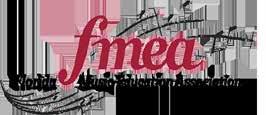

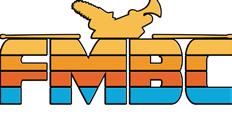
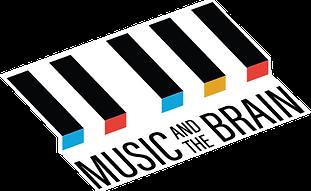

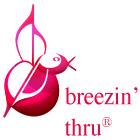


Partners as of April 7, 2025.
*Please visit FMEA.org/partners for partnership details or call 850-878-6844.


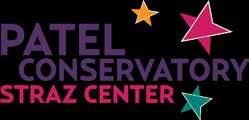
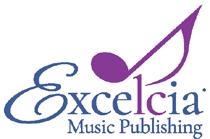


The mission of The Florida Music Education Association is to promote quality, comprehensive music education in all Florida schools.

We are nearing the end of the 2024-25 school year. The Florida Music Education Association is working hard to assist members and students. If you have questions or suggestions, please reach out to the office staff and the FMEA Board of Directors, who can be found in this magazine.
FMEA has been focusing on Teach Music Florida, an initiative to improve and increase teacher recruitment and retention in the music education field in Florida schools. FMEA will convene a workgroup this summer to continue to provide forward-thinking for music education in Florida.
The FMEA’s advocacy efforts included Collegiate Advocacy Day, held March 25, during which college students from throughout the state visited legislators to share the FMEA Legislative Platform, which includes PE credit for marching band, acceleration points for students receiving the Florida Seal of Fine Arts, statistics from all-state and music performance assessments, and promotional materials about Teaching Music in Florida and Careers in Music.

The 2025 Regular Legislative Session ended on May 2, 2025. FMEA will post a summary report on its advocacy page.
FMEA seeks to spotlight the outstanding work and accomplishments of music educators in the earlier stages of their teaching careers who are making an “immediate impact” in their schools, communities, and students. Through the power of music education, these ambitious FMEA members influence positive change, create amazing musical experiences for their students, and help enrich Florida’s music education community. Let us brag about you! Please submit the form and materials found on the FMEA website.

Each year beginning April 1 we open the membership registration process. The membership year for FMEA is July 1, 2025, to June 30, 2026. Joining is easy and online. If you need assistance, please call the FMEA office. FMEA is your way to keep current on music education events and resources. Please visit the website to learn more.
We hope you had a successful school year and will have a restful and fulfilling summer.
Kathleen D. Sanz, PhD
2026 FMEA Professional Development Conference and All-State Concerts
Our theme is The Power in Our Profession: Music Education Collective Impact. SAVE the date: January 14-17, 2026, in Tampa, Florida. The deadline for proposals is May 9, 2025. The portal for session proposals is open. We look forward to seeing session proposals for 2026.
The annual FMEA Multicultural Network (MCN) Summer Music Education Conference Workshop “Harmony in Motion” will be held on June 20, 2025, at St. Thomas University. For more information, please see the FMEA website.



Florida schools are making preparations for summer band camps and marching activities. The Florida sun can be very intense, and dehydration is a key risk for teachers and students. It is critically important for teachers to be aware of the heat index information. Marching to the Beat of Safety: Preventing and Managing Heat Related Illness by Dr. Neha Raukar from the Mayo Clinic is a webinar that you should view and share with colleagues and parents. It includes information on Understanding Heat Illness, Prevention and Management, Risks in Marching Band, and National Weather Service Resources. Please see the resources and webinar produced by the National Federation of High Schools (NFHS) at artsadvocacy.nfhs.org/heat-illness
In addition, the National Federation of High Schools (NFHS) has developed online courses that assist music educators who have students in physical activity. These courses are free of charge, and FMEA and FSMA encourage every school district and school program to be sure that all teachers are aware of the dangers they and students face in light of Florida’s weather, which in many of our counties can include lightning strikes without warning. Please be cautious. The three courses from NFHS include:
Heat Illness Prevention
Concussion in Sports –What You Need to Know
Sudden Cardiac Arrest
nfhslearn.com/courses/heat-illnessprevention-2
nfhslearn.com/courses/concussion-insports-2
nfhslearn.com/courses/sudden-cardiacarrest
In addition to the courses listed above, please see the information and links on the FSMA website for keeping our students and teachers safe in the Florida heat.
Crossover Festivals
Crossover Festivals are scheduled in May throughout Florida. The Florida Music Education Association Crossover Festivals are designed to encourage musical creativity, critical thinking, and collaboration by students in K-12 schools.
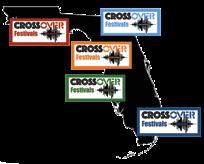
Festival Locations:
w Gainesville (Santa Fe College) – May 9, 2025
w Tampa (University of South Florida) – May 15, 2025
w Tallahassee (Florida State University) – May 17, 2025
The FMEA Guitar Festival was held February through April. Thank you to Ed Prasse for coordinating this event for student guitarists.

The FMEA Steel Band Festival was held April 12, 2025, at Blankner K-8 School in Orlando. Thank you to Jared Allen for coordinating this event for steel band students.

